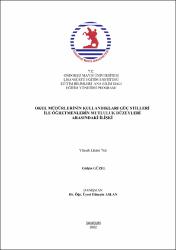| dc.contributor.advisor | Aslan, Hüseyin | |
| dc.contributor.author | Güzel, Gülçin | |
| dc.date.accessioned | 2023-08-10T10:52:24Z | |
| dc.date.available | 2023-08-10T10:52:24Z | |
| dc.date.issued | 2022 | en_US |
| dc.date.submitted | 2022 | |
| dc.identifier.citation | Güzel, G. (2022). Okul müdürlerinin kullandıkları güç stilleri ile öğretmenlerin mutluluk düzeyleri arasındaki ilişki. (Yüksek lisans tezi). Ondokuz Mayıs Üniversitesi, Samsun. | en_US |
| dc.identifier.uri | http://libra.omu.edu.tr/tezler/144937.pdf | |
| dc.identifier.uri | https://hdl.handle.net/20.500.12712/34111 | |
| dc.description | Tam Metin / Tez | en_US |
| dc.description.abstract | Bu araştırmada okul müdürlerinin kullandıkları güç stilleri ile öğretmenlerin
mutluluk düzeyleri arasındaki ilişkiyi ortaya koymak amaçlanmıştır. Araştırma
evrenini 2020-2021 Eğitim öğretim yılında Samsun ilinde görev yapan 20.581
öğretmen oluşturmaktadır. Araştırmanın örneklemini basit tesadüfi örneklem
yöntemi ile seçilmiş 502 öğretmen oluşturmaktadır. Araştırmada, Koşar (2008)
tarafından geliştirilen “Güç Tipi Ölçeği’’ ve Hills ve Argyle (2002) tarafından
geliştirilmiş ve Doğan (2012) tarafından Türkçe’ ye uyarlanmış olan “Oxford
Mutluluk Ölçeği” kullanılmıştır.
Araştırma sonucunda, öğretmen görüşlerine göre okul müdürlerinin en çok
kullandıkları güç stillerinin ödül gücü, kişilik gücü, yasal güç ve zorlayıcı güç
şeklinde sıralandığı, kişilik ve zorlayıcı güç stiline ilişkin öğretmen görüşlerinin
cinsiyetlerine göre farklılaştığı sonucuna ulaşılmıştır. Kadın öğretmenlerin “kişilik’’
alt boyutu düzeyleri, erkek öğretmenlerden anlamlı düzeyde daha yüksektir. Medeni
durum değişkenine göre, güç tipi ölçeği alt boyut toplam puanlarında hiçbir grupta
istatistiksel açıdan anlamlı fark meydana gelmediği, yaş değişkenine göre ‘’yasal’’
alt boyutu dışında diğer boyutlarda istatistiksel açıdan anlamlı fark olmadığı, okul
türü değişkenine göre öğretmenlerin güç tipi ölçeği alt boyut toplam puanlarında tüm
alt boyutlarda istatistiksel açıdan anlamlı fark olduğu, mesleki kıdem değişkenine
göre yasal ve zorlayıcı güç alt boyutlarda, mezuniyet düzeyi değişkenine göre ise
ödül alt boyutunda farklılaştığı sonucuna ulaşılmıştır. Araştırma sonucunda
öğretmenlerin mutluluk düzeylerine ilişkin görüşlerinin ‘’katılıyorum’’ düzeyinde
olduğu, öğretmenlerin mutluluk düzeylerinin cinsiyet, medeni durum, yaş, görev
yapılan okul türü, mesleki kıdem, mezuniyet düzeyi açısından değişmediği
görülmüştür.
Araştırma sonucunda öğretmenlerin mutluluğunun okul müdürlerinin
kullandıkları kişilik ve ödül gücü ile pozitif yönde bir ilişki; zorlayıcı güç ile negatif
yönde bir ilişki olduğu, okul müdürlerinin kullandıkları güç stillerinden
öğretmenlerin mutluluğunun yordanamayacağı anlaşılmıştır. | en_US |
| dc.description.abstract | In this study, it was aimed to reveal the relationship between the power styles
used by school principals and the happiness levels of teachers. The research
population consists of 20,581 teachers working in Samsun in the 2020-2021
academic year. The sample of the study consists of 502 teachers selected by simple
random sampling method. The "Power Type Scale" developed by Koşar (2008) and
the "Oxford Happiness Scale" developed by Hills and Argyle (2002) and adapted to
Turkish by Doğan (2012) were used in the research.
As a result of the research, it was concluded that the most used power styles by
school principals according to teachers' opinions were listed as reward power,
personality power, legal power and coercive power, and teachers' views on
personality and coercive power style differed according to their genders. The
"personality" sub-dimension levels of female teachers are significantly higher than
male teachers. According to the marital status variable, there was no statistically
significant difference in any group in the total scores of the power type scale subdimension, there was no statistically significant difference in the other dimensions
except for the "legal" sub-dimension according to the age variable, and according to
the school type variable, there was no statistically significant difference in the
teachers' power type scale sub-dimension. It was concluded that there was a
statistically significant difference in all sub-dimensions in total scores, legal and
coercive power sub-dimensions according to professional seniority variable, and
reward sub-dimension according to graduation level variable. As a result of the
research, it was seen that the opinions of the teachers about the happiness levels were
at the level of "I agree", and the happiness levels of the teachers did not change in
terms of gender, marital status, age, type of school, professional seniority, graduation
level.
As a result of the research, a positive relationship between teachers' happiness
and the personality and reward power used by school principals; It has been
understood that there is a negative relationship with coercive power, and that the
happiness of teachers cannot be predicted from the power styles used by school
principals. | en_US |
| dc.language.iso | tur | en_US |
| dc.publisher | Ondokuz Mayıs Üniversitesi Lisansüstü Eğitim Enstitüsü | en_US |
| dc.rights | info:eu-repo/semantics/openAccess | en_US |
| dc.subject | okul müdürü | en_US |
| dc.subject | öğretmen | en_US |
| dc.subject | güç stili | en_US |
| dc.subject | mutluluk | en_US |
| dc.subject | school principal | en_US |
| dc.subject | teacher | en_US |
| dc.subject | poer style | en_US |
| dc.subject | happiness | en_US |
| dc.title | Okul müdürlerinin kullandıkları güç stilleri ile öğretmenlerin mutluluk düzeyleri arasındaki ilişki | en_US |
| dc.title.alternative | The effect of power styles used by school principals on teachers' happiness level | en_US |
| dc.type | masterThesis | en_US |
| dc.contributor.department | OMÜ, Lisansüstü Eğitim Enstitüsü, Eğitim Bilimleri Ana Bilim Dalı | en_US |
| dc.contributor.authorID | 0000-0001-9741-3933 | en_US |
| dc.contributor.authorID | 0000-0003-2724-0445 | en_US |
| dc.relation.publicationcategory | Tez | en_US |
















